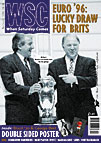 A look into how club owners business mentality needs to stretch from the football field
A look into how club owners business mentality needs to stretch from the football field
Imagine for a moment that we have taken leave of our senses. As is common with those who find themselves in a befuddled state, a single concept has become fixed in our heads, one which we are doggedly determined to communicate to as many people as possible. It might run something along these lines. The Football Trust should be abolished. Far from making grants to football clubs, the government should seek to extract every available penny from them; unlike other businesses, which may be free to relocate abroad, football clubs, even Wimbledon, for example, are tied to specific locations. The Japanese are unlikely to want to build any football clubs over here while they’re still getting the hang of their own, so no harm would be done to ‘inward investment’ by closing down any tax advantages clubs might have.
Of course clubs make large demands on the community, encouraging huge influxes of people into small areas of towns and cities which cannot easily cope, in a way that most other businesses don’t. Other companies based near grounds may have to limit their trading; those that rely on prompt road transport suffer most severely, due to the traffic congestion caused. While some traders in the area immediately by the stadium may derive economic benefit, clubs should be forced to compensate those businesses which can demonstrate that, on any given day, their takings suffer as a result of the location of a football ground; Sainsbury’s at Selhurst Park have a particularly strong case.
Clubs have complained in recent years about the rise in police costs, as authorities attempt to claim a larger percentage of the money spent on policing games. Why not make that 100 per cent? No other business would have the cheek to claim, never mind expect, any such costs to be born by tax payers.
Right, finished. Such opinions, normally to be found only in the letters columns of newspapers that take Paul Johnson seriously, are logical extrapolations of the attitudes we are now seeing in the game. Looking at the way in which so many clubs are seeking to act, demanding the right to be treated as normal businesses, with no more restrictions on their activities, what possible justification can there be for all this unnecessary molly-coddling?
Football clubs’ continued denial that they have any wider social role, combined with a request for special pleading, has been a hypocritical characteristic of their reaction to many of the issues that have cropped up lately – the Bosman judgment, the squabbling over the new television deal with ITV and Sky, Wimbledon’s proposed move out of London, even the tug of war over Mark McGhee. Club owners are demanding free market rights, at the same time as bleating about their special status. How many of those First Division clubs now demanding a larger slice of the TV money objected when Premiership sides did the same thing? How can Leicester, for example, object to losing managers when they have taken from others?
You might recall at school, there was always one kid who proclaimed themselves an expert on every subject and proceeded to ramble on about it serenely oblivious to the fact that everyone around them knew they were talking complete gibberish? And they would not learn. If you’ve ever wondered how children with this self-awareness bypass developed in later life (they’re not, after all, the schoolmates you’re most likely to keep in touch with), then a quick glance at the names that crop up in the press whenever football is plunged into one of its self-inflicted crises will quickly relieve any curiosity you may feel in this area. And if you have ever felt the slightest pang of guilt about holding the head of a future member of the FA International Committee over the toilet bowl and threatening to pull the chain – don’t: you had been provoked beyond reason.
From WSC 108 February 1996. What was happening this month